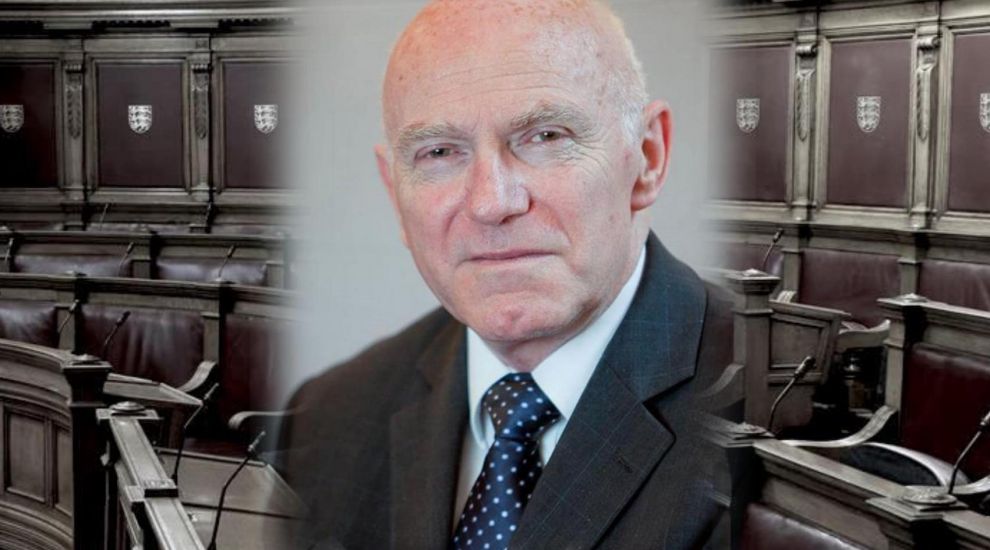

A politician, who breached confidentiality rules by identifying a government employee under investigation, failed to fully cooperate with an investigation into his own conduct, the States behaviour watchdog has ruled.
The findings about Deputy Mike Higgins came from Commissioner for Standards Dr Paul Kernaghan yesterday, following an investigation spanning over a year-and-a-half.
He concluded in his report that the Deputy had breached confidentiality rules by naming a member of States staff undergoing a disciplinary investigation, but did not do so by referring to a vulnerable family in a debate about abuse in the island’s care system.
The complaint came from former Health Minister Senator Andrew Green in July 2017.
He accused the Deputy of breaching confidentiality rules by identifying a member of staff, and making remarks about a specific family using island’s the care system during a States-wide discussion of the findings of the Care Inquiry, which uncovered the child abuse of those within the island’s care institutions spanning over 60 years.

Pictured: The complaint came from former Health Minister Senator Andrew Green.
During the debate, the Deputy referred to a letter from a senior social services official, who he incorrectly identified as being the head of Children’s Services, containing what he described as “defamatory” remarks and went on to accuse the officer of “manufacturing evidence."
The Minister told the Commissioner he believed this to have been wrong on several counts.
He argued that Deputy Higgins should not have identified the member of staff given that there was an investigation already ongoing into their behaviour, prompted by the individual who was allegedly defamed. Moreover, he said that the use of the wrong title was problematic as it identified an “uninvolved person."
Senator Green told the Commissioner that this was a breach of Article 6 of States Members’ Code of Conduct, which means details of disciplinary matters should be kept confidential. Under this provision, States Members intending to discuss a particular member of staff in the States Chamber must inform them in advance.
Deputy Higgins said that his use of the wrong title had been a genuine mistake, attributing this to misreporting of the staff member’s title in local newspaper reports.
He further argued that he felt it was in the public interest to raise his concerns about the staff member publicly in order to “get the allegations out into the open and investigated."
Pictured: Deputy Higgins' comments came during an in-committee States Assembly debate about the Care Inquiry.
It was further alleged that Deputy Higgins had revealed the identity of a vulnerable family he was helping by referring to allegations of sexual abuse and the fact they had been involved with Social Services over a number of years.
During the debate, the Deputy accused Health and Social Services of withholding information, and said he felt “fobbed off” when he tried to investigate their case.
Senator Green said that he had “misrepresented the facts” as the Department were only following data protection protocol procedures and that it was not appropriate to discuss their case in front of fellow States Members.
Following assertions from Deputy Higgins that the family were somewhat “reclusive” and would not be identifiable from these comments alone, the Commissioner concluded that there was no “evidence that the information he used compromised the identity of the individuals concerned."
The Commissioner noted his concern, however, said that Deputy Higgins “did not fully co-operate with my investigation as required."
He explained that he had asked for a “full and accurate account” of Deputy Higgins’ version of events in November 2017, but that he did not reply until nearly four months later in March 2018.

Pictured: The Commissioner said that it was important politicians can express their views "openly and transparently" in the States Assembly.
When he did finally reply, the Commissioner said that Deputy Higgins did not fully address his query over whether identifying the States worker under investigation was in the wider public interest.
He said that Deputy Higgins’ lack of cooperation with the investigation was something for which he felt “regret… on his behalf”, given that he was then forced to make a decision “on the balance of probabilities." In the absence of further evidence from Deputy Higgins, he found against him.
“It is important in any democracy that elected Members can express their view openly and honestly and that on occasions that they may do so in a passionate and robust manner... Deputy Higgins accepts that he incorrectly identified an officer by using the wrong job title and, whilst such a mistake is to be regretted, I am satisfied that Deputy Higgins made a mistake and that there was no malicious intent underpinning his action,” the Commissioner noted.
He concluded by making a wider point about elected representatives’ role.
“Elected Members enjoy a privileged position as they represent the electorate and must be free to fully represent their constituents. However, public servants also play a crucial part in the delivery of public services and are entitled to be respected by elected Members. Crucially, such employees and officers are subject to disciplinary codes and processes and that reality is specifically mentioned in the Code of Conduct for Elected Members. Deputy Higgins failed to observe the requirements of the Code of Conduct and thus potentially compromised both an individual employee’s rights and the wider confidence that such employees should feel in their rights and the legislature which they ultimately serve.”
The findings were referred to the Privileges and Procedures Committee – a panel of politicians governing how the States Assembly functions – who recommended no further action be taken against the Deputy.
Comments
Comments on this story express the views of the commentator only, not Bailiwick Publishing. We are unable to guarantee the accuracy of any of those comments.